By Clearday Research Team
Outpatient and inpatient facilities are increasingly being measured on patient experience and health outcomes – pillars of value-based care – and increasingly reimbursed for the care management activities required beyond initial diagnosis for chronic diseases. The effect on financial performance is limited right now, but likely to be more focused on. These measures are also expanding to home health agencies and skilled nursing facilities, reflecting the shift to value over fee-for-service in long-term care.
This shift incentivizes care coordination and comprehensive care management – from diagnosis, to care planning, care transitioning, patient/caregiver education, and more – for chronic diseases like Alzheimer’s/Dementia. It also provides mutual benefit to providers through lower healthcare utilization, higher quality scores for reputation (and reimbursement), and unnecessary-care cost savings.
30% of CMS’s calculation for reimbursement comes from HCAHPs, patient experience surveys, as part of the Hospital Value-Based Purchasing Program (HBVP) program; however, Medicare incentives for higher HCAHPs accounts for only 7% of the correlation between patient experience and financial performance right now. (Deloitte, 2016).
Cognitive impairment assessments and all associated care planning services for dementia care are reimbursed by CMS and supported by recent legislation like the Improving HOPE for Alzheimer’s Act (Alzheimer’s Association, 2018; Alzheimer’s Association, 2019; CMS, 2021) CMS is also reimbursing for transition care management services (99495-99496) – the care planning work required to move from acute inpatient hospital to other facilities (such as homecare and assisted living) (Tan et. al, 2015, UKY Medicine, 2013). CMS is also recognizing that providers need to be reimbursed for all the effort outside of the patient visit in managing complex chronic care management.
At Clearday™, we believe that services and solutions that increase the quality of care provided during diagnosis, care plan creation, patient education, and delivery of treatment at the patient’s location can improve providers’ bottom line. See how Clearday helps by clicking here.
This blog and related materials prepared by Clearday, Inc. may use publicly available information including market research, studies or reports by unaffiliated third parties that include market demographics and other relevant market or research information. Such information or a link to such information is available upon request. We do not warrant any such information and do not have information that causes us to believe that any such market research, studies or reports are not correct in all material respects.
